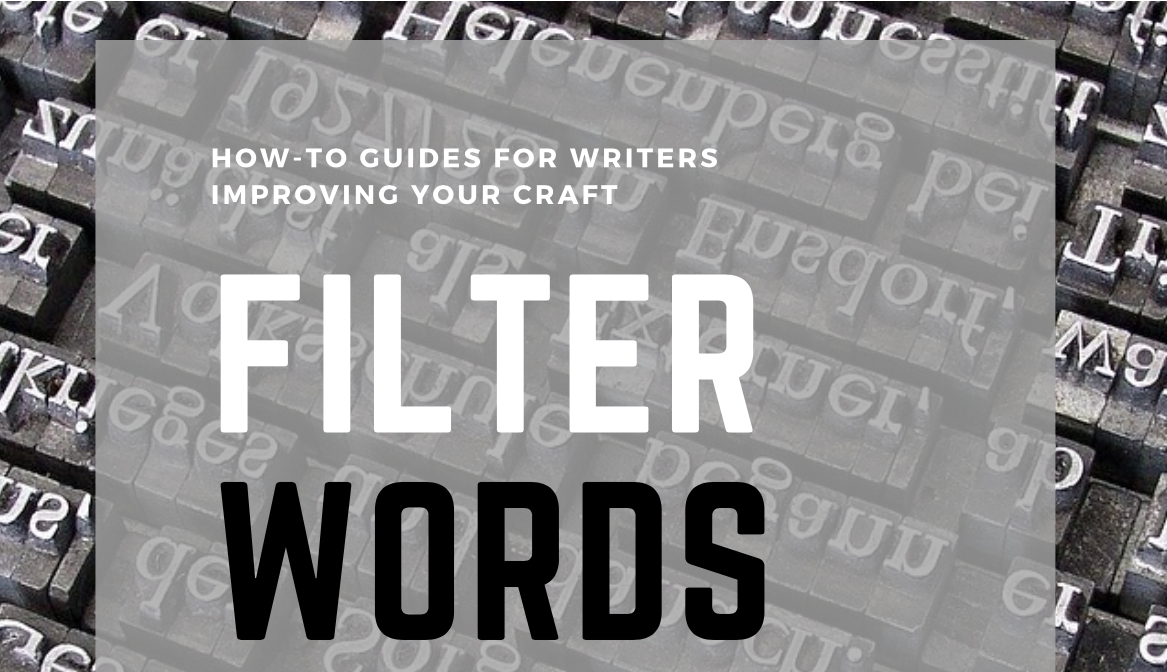Why Care About Filter Words?
This was my question when members of my online writing community Scribophile first called me on the carpet in their critiques of my WIPs for using way too many filter words. (WIPs = works-in-progress)
And, I still do….use too many….
What Are Filter Words?
And why should I care? I had to learn more. Why?
When I wrote communications and training content in the corporate world, I never heard that phrase. It seems to matter It matters a great deal in the creative writing world. Or, so said the members of my online writing community, Scribophile.
Their feedback on my stories created an itch about filter words, and I scratched it. Thanks to the almighty World Wide Web, my research on the keywords “filter words” rewarded me with gems of useful information.
Who woulda thunk?
And, I felt a bit sheepish my brain’s mental light bulb flashed once I saw examples of filter words illuminated my thoughts.
The strike-through phrases give you a few examples of filter words.
Filter Words Examples
Filter Words are words and phrases that insert themselves between your readers and your narrative, creating unnecessary distance, whether it’s fiction or nonfiction.
 Current events surrounding SARS-CoV-2 (COVID-19) provide one example of how Filter Words affect your readers:
Current events surrounding SARS-CoV-2 (COVID-19) provide one example of how Filter Words affect your readers:
Masks.
Masks provide a filter between your respiratory system and what’s floating in the air around you, keeping you from fully immersing your respiratory system in the airborne particles.
Filter words and phrases in your writing keep your readers from fully immersing themselves in your message, article, or story.
When it comes to my WIPs, my use of mask-like words and phrases keeps my narrative descriptions from fully impacting my readers’ emotions, thoughts, imagination, etc.
A few filter word examples include:
-
- I feel sad.
- Mary looked at the hiking trail.
- Jason appeared to ignore his son’s request.
What About Your Writing?
Whether you write for business, for school as a student, for academia as an educator, or wherever you write, filter words creep into your drafts unawares, dulling your communications and frustrating your readers.
Never fear, help is here.
eBook (PDF Format)
Whether you’re writing for school, business communications, or composing short stories or your novel, filter words distance your reader from your message or your story. I created this guide in PDF file format to help me improve my writing. I want to share what I learned with you.
Select the link to download your free eBook:
A Note to Writing Coaches
If you’re a writing coach and would like to share this resource with your clients/mentees/seminar attendees (etc.), please contact me to request permission in writing. And, thank you for considering this resource!
If you like what you’re reading and appreciate the free eBook resource and want to show appreciation, take a look at my Tip Jar information on the Hire Me/Contact page (link above).
Your Turn
Let me know your thoughts in Comments below about filter words, and what you’ve learned from the eBook’s resources.
Note: When you write a comment, I’ll respond. To view my response, make sure you get notified via email by selecting the checkbox for “Notify me via e-mail if anyone answers my comment.”
Featured image credit: Filter Words eBook cover by Jenise Cook

I haven’t heard these referred to as filter words before, but as “filler words”.
No matter what you call them, I’m guilty of using them, too.
A rule of thumb that I love for writing is “Show, don’t tell.” It’s easier to communicate concisely when I keep that in mind.
Wonderful ebook – thanks for the resource!
Hi, Jen:
I’m glad you not only visited, but you’ve left a comment and downloaded the free eBook!
My online writers’ community uses “filter words”, although I’m aware others say “filler words”. As I mentioned in my blog post above, we see these phrases as “filters”, like a mask, that’s between the content and the reader.
I read the entire post before my comment, and I’m happy to say that I like your phraseology better since it describes the effect it has on the reader.
The other word connotates unnecessary “fluff,” but sometimes we like a bit of fluff (especially in terms of pillows and other comfort objects).
I suppose we need a filter every so often as well (especially when it comes to our drinking water) but your mask example is a good illustration that it serves as a barrier between the writer and the reader. At the height of the pandemic, it was especially difficult to communicate with the masks on our faces (particularly so for deaf people who read lips).
Thanks again for this important article!
I so appreciate your perspective!
My writers’ group “pounded” the concept of a “filter” into me a few years ago (pre-2020) when they critiqued the drafts of my WIPs.
I deserved it; they were right.
You’re welcome, Jen, and I’m grateful you’ve visited and left comments. No one does anymore, and I may start a RVM publication on Substack where there’s more engagement.